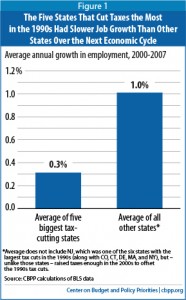A recent study by the Center on Budget and Policy Priorities, “State Personal Income Tax Cuts: A Poor Strategy for Economic Growth” shows how states with large tax cuts in the years leading up to the recent recession have fared after those decisions. They report, “[s]tates that enacted major personal income tax cuts in the 2000s, before the most recent recession hit, were as likely to lose economic ground as to gain it.” The half of the states with such cuts that performed better than the national average were all supported by oil and natural gas production. The other half had slower growth than the national average in job creation, production growth, and income growth.
The results were similar for those states with large tax cuts in the 1990’s. The figure from the report below shows that the five biggest tax cutting states in the 90’s had only 1/3 the average annual job growth of other states.
The bottom line? The promise of economic growth from income tax cuts, is often not the reality. Instead, state budgets are threatened, taxes are increased in other areas, and/or vital services like education are cut and tuition is increased at the state’s colleges. With revenues still struggling to recover from the recession and the ongoing threat of federal budget cuts looming, Mississippi simply cannot afford a large income tax cut. A much smarter approach would be to focus on closing all of the corporate loop holes that cost the state millions of dollars and investing the savings into things that really grow the economy like education and health care







